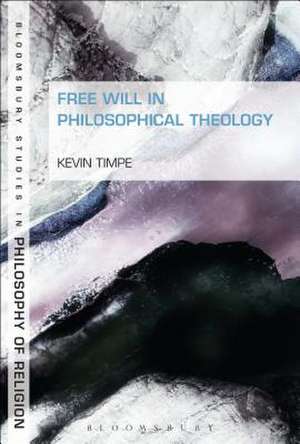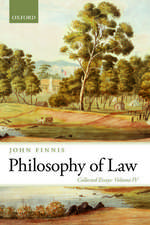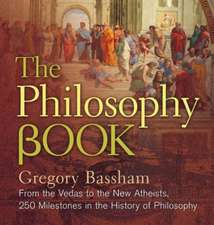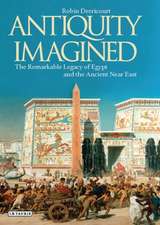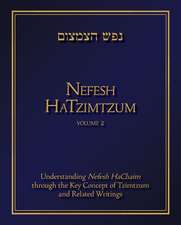Free Will in Philosophical Theology
Autor Professor Kevin Timpeen Limba Engleză Paperback – 20 mai 2015
| Toate formatele și edițiile | Preț | Express |
|---|---|---|
| Paperback (1) | 255.47 lei 6-8 săpt. | |
| Bloomsbury Publishing – 20 mai 2015 | 255.47 lei 6-8 săpt. | |
| Hardback (1) | 830.20 lei 6-8 săpt. | |
| Bloomsbury Publishing – 15 ian 2014 | 830.20 lei 6-8 săpt. |
Preț: 255.47 lei
Preț vechi: 330.13 lei
-23% Nou
Puncte Express: 383
Preț estimativ în valută:
48.89€ • 50.07$ • 40.67£
48.89€ • 50.07$ • 40.67£
Carte tipărită la comandă
Livrare economică 18 martie-01 aprilie
Preluare comenzi: 021 569.72.76
Specificații
ISBN-13: 9781501308680
ISBN-10: 1501308688
Pagini: 192
Dimensiuni: 152 x 229 x 10 mm
Greutate: 0.26 kg
Editura: Bloomsbury Publishing
Colecția Bloomsbury Academic
Locul publicării:New York, United States
ISBN-10: 1501308688
Pagini: 192
Dimensiuni: 152 x 229 x 10 mm
Greutate: 0.26 kg
Editura: Bloomsbury Publishing
Colecția Bloomsbury Academic
Locul publicării:New York, United States
Caracteristici
Examines
shift
in
philosophy
of
religion
from
natural
theology
to
philosophical
theology
Notă biografică
Kevin
Timpe
is
Professor
of
Philosophy
at
Northwest
Nazarene
University,
USA,
and
former
Templeton
Research
Fellow
at
St.
Peter's
College,
University
of
Oxford,
UK.
He
is
the
author
ofFree
Will:
Sourcehood
and
Its
Alternatives(Continuum,
2008)
andFree
Will
in
Philosophical
Theology(Continuum,
forthcoming).
He
is
also
editor
ofMetaphysics
and
God(Routledge,
2009),Arguing
aboutReligion(Routledge,
2009)
and
(with
Craig
Boyd)Virtues
and
Their
Vices(Oxford
University
Press,
forthcoming).
His
recent
publications
have
appeared
inPhilosophical
Studies,
AmericanPhilosophical
Quarterly,
Canadian
Journal
of
Philosophy,
Faith
and
Philosophy,
Religious
Studies,
andPhilosophia.
Cuprins
DedicationAcknowledgements
Chapter
1:
The
Importance
and
Nature
of
Free
Will1.1
Introduction1.2
Philosophical
Theology1.3
The
Nature
of
Free
Will:
Source
Incompatibilism1.4
The
IssuesChapter
2:
Free
Will
and
the
Good2.1
Choice,
the
Good,
and
Teleology2.2
Reasons
and
Choice2.3
Moral
Character
and
Agency2.4
Moral
Character
and
HabitChapter
3:
The
Primal
Sin3.1
Introduction3.2
Katherin
Rogers
on
Anselm3.3
Scott
MacDonald
on
Augustine3.4
Taking
StockChapter
4:
Realigning
a
Fallen
Will4.1
Introduction4.2
Grace
and
Theological
Determinism4.3
Non-deterministic
Grace4.4
Stump
on
Grace
and
Faith4.5
Refraining,
Quasi-causing,
and
Control4.6
ConclusionChapter
5:
Damned
Freedom5.1
Introduction5.2
The
Traditional
Doctrine
of
Hell5.3
The
Choice
Model
of
Hell5.4
Death
and
Psychological
Impossibility5.5
Overcoming
Two
Objections5.6
ConclusionChapter
6:
Perfected
Freedom6.1
Introduction6.2
Virtue
Libertarianism
in
Heaven6.3
Warding
Off
Objections6.4
Moral
Perfection
and
Purgatory6.5
ConclusionChapter
7:
Divine
Freedom7.1
Virtue
Libertarianism
and
History7.2
Morriston
on
Moral
Freedom
and
History7.3
Divine
Freedom
and
Moral
Freedom7.4
God's
Freedom
as
the
Truest
Freedom7.5
Divine
Freedom
God's
Choice
to
CreateBibliographyIndex
Recenzii
This
is
a
splendid
contribution
to
the
literature
on
free
will.
Set
in
the
borderlands
between
philosophy
and
theology,
Timpe's
work
shows
how
a
substantial
vision
of
free
will
can
be
integrated
into
a
robust
account
of
sin
and
grace.
The
concepts
deployed
are
clear,
the
arguments
articulated
are
felicitous,
and
the
overall
result
is
a
book
worthy
of
our
closest
attention.
Kevin Timpe applies the insights of his previous excellent work on the nature of free will to a number of central topics in the Biblical drama, from the fall to heaven and hell. The result is a first rate contribution to philosophical theology that is as theologically rich and illuminating as it is philosophically rigorous.
In this volume Kevin Timpe sets out to "tell a theological story philosophically." This story concerns the place occupied by discussion of free will in Christian theology. It is a story told from a certain perspective, what he calls "philosophical Arminianism," a version of libertarianism. By attending to some of the most fundamental difficulties in the Christian tradition -- problems such as the origin of sin, human freedom in relation to salvation by divine grace, the freedom of those in heaven and and those in hell, and God's freedom -- Timpe offers his readers a rich and powerful case for thinking about contemporary theological concerns in a philosophical key. Clearly written and carefully argued, this is analytic theology at its best.
Philosophy of religion and questions concerning free will constitute two of the most vibrant areas in philosophy today. InFree Will and Philosophical TheologyKevin Timpe combines the two. He proposes a version of source incompatibilism - free will means that you, the agent, are the ultimate cause of your choices - and then, with this brand of libertarianism in place, attempts to analyze issues, problems, and puzzles involving free will and traditional Christian doctrine. His topics include the primal sin, grace, the freedom of the damned and the beatified, and divine freedom. These issues are perennial for the Christian thinker, but, to my knowledge, Timpe's is the first contemporary work to bring them all together in a single analytic volume. The volume makes a real contribution to contemporary analytic philosophy of religion.
There is much to admire in Kevin Timpe's book. It brings philosophers and Christian theologians into deeper conversation about such issues of shared interest as autonomy, responsibility, meaning, and value. [.] We look forward to further discussion of the issues that Timpe has so boldly and brilliantly taken. Even if one disagrees with some of the views he defends, this book is highly valuable since it sets out a coherent and attractive position with clarity and skill.
[T]houghtful, well-researched and well-argued ...That is not to say, of course, that [Timpe] lays the topics to rest; they will continue to be controversial, just as the very existence of free will remains controversial. But anyone concerned with one or more of these questions will find Timpe's thoughts about them well worth considering ... Disagreements of this sort in no way detract from the excellence of Timpe's accomplishment in his book; rather, they underscore that excellence by showing how the book provides fodder for further reflection. The work deserves careful consideration by all theologians and philosophers who are engaged with the important problems it addresses.
Kevin Timpe applies the insights of his previous excellent work on the nature of free will to a number of central topics in the Biblical drama, from the fall to heaven and hell. The result is a first rate contribution to philosophical theology that is as theologically rich and illuminating as it is philosophically rigorous.
In this volume Kevin Timpe sets out to "tell a theological story philosophically." This story concerns the place occupied by discussion of free will in Christian theology. It is a story told from a certain perspective, what he calls "philosophical Arminianism," a version of libertarianism. By attending to some of the most fundamental difficulties in the Christian tradition -- problems such as the origin of sin, human freedom in relation to salvation by divine grace, the freedom of those in heaven and and those in hell, and God's freedom -- Timpe offers his readers a rich and powerful case for thinking about contemporary theological concerns in a philosophical key. Clearly written and carefully argued, this is analytic theology at its best.
Philosophy of religion and questions concerning free will constitute two of the most vibrant areas in philosophy today. InFree Will and Philosophical TheologyKevin Timpe combines the two. He proposes a version of source incompatibilism - free will means that you, the agent, are the ultimate cause of your choices - and then, with this brand of libertarianism in place, attempts to analyze issues, problems, and puzzles involving free will and traditional Christian doctrine. His topics include the primal sin, grace, the freedom of the damned and the beatified, and divine freedom. These issues are perennial for the Christian thinker, but, to my knowledge, Timpe's is the first contemporary work to bring them all together in a single analytic volume. The volume makes a real contribution to contemporary analytic philosophy of religion.
There is much to admire in Kevin Timpe's book. It brings philosophers and Christian theologians into deeper conversation about such issues of shared interest as autonomy, responsibility, meaning, and value. [.] We look forward to further discussion of the issues that Timpe has so boldly and brilliantly taken. Even if one disagrees with some of the views he defends, this book is highly valuable since it sets out a coherent and attractive position with clarity and skill.
[T]houghtful, well-researched and well-argued ...That is not to say, of course, that [Timpe] lays the topics to rest; they will continue to be controversial, just as the very existence of free will remains controversial. But anyone concerned with one or more of these questions will find Timpe's thoughts about them well worth considering ... Disagreements of this sort in no way detract from the excellence of Timpe's accomplishment in his book; rather, they underscore that excellence by showing how the book provides fodder for further reflection. The work deserves careful consideration by all theologians and philosophers who are engaged with the important problems it addresses.
